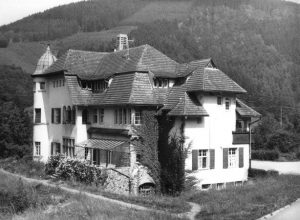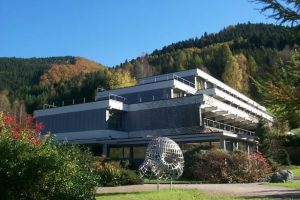
As the Second World War drew to a close, the Allies began the task of tracking down German scientists. The main reason – with the onset of the Cold War already looming – was to get their hands on those who had been involved in the development of the dreaded V2 military rocket, both to exploit their expertise and to prevent them from going “over to the other side”. In any case, the spectrum of the search was broad and all kinds of scientists were to be tracked down.
In 1945, John Todd was a young Irish mathematician aged 34, working alongside mathematicians of various nationalities in the British Admiralty Computing Service. Various indirect leads had pointed to the possible existence of a mathematical research centre in the Black Forest. A five-member team was set up to search for it. They were appointed as volunteer navy reservists, wearing the unusual khaki-coloured uniforms of the Royal Marine Commandos and carrying maps of Germany.
They headed immediately for the continent, and in Brussels they obtained a military vehicle. As was to be expected, from there their journey through Germany was full of incidents: a visit to a convent to deliver a letter to the wife of a Polish mathematician who had taken refuge in Scotland; a check by Russian troops as they passed through Magdeburg; the breakdown of the vehicle near Heidelberg, helped by Russian prisoners of war travelling to the East. In Tübingen, because of his peculiar uniform, John Todd shared a table, and speech, with the French military governor of the area.
After a month’s journey, they eventually reached the small village of Oberwolfach, situated on the banks of the Wolf River in the heart of the Black Forest. There they found “Lorenzhoff”, a former hunting lodge that had been transformed into the Mathematisches Forschungsinstitut Oberwolfach, the MFO, the Mathematical Research Institute of Oberwolfach. They found a number of German mathematicians gathered there, together with their working papers and books.
On the first night, for security reasons, notices were posted at the entrance to the shelter indicating that the site was under the protection of the British Navy. The next day the rest of the team left to get petrol, leaving Todd as the only member of the “occupying army”. A mid-morning commotion accompanied the arrival of a party of hungry Moroccan troops who intended to occupy the building. Todd’s resolute stance, accompanied by his bombastic uniform and hat, succeeded in dissuading the hungry party from taking the building (and the chickens, Todd clarifies) and thus saved the institute from becoming a military barracks, until the local government placed it under its authority. The subsequent protection of French mathematicians (the MFO was in the French occupation zone) ensured the integrity of the institute.
Todd returned to England with seventy kilos of German mathematical books published during the war, which the authors themselves, refugees in Oberwolfach, had given him. The unusual nature of his mission caused him some difficulties on entering the country.
The MFO had been founded in the autumn of 1944, with Wilhelm Süss as its first director. Süss was a controversial mathematician: pupil of the excellent pro-Nazi mathematician Ludwig Bieberbach; editor of the journal “Deutsche Mathematik”, notorious for its racist positions; he was close to power during the Nazi rule of Germany. After the war he was exonerated thanks to the testimony of mathematicians such as Carathéodory, Tietze, Hopf and others, who recounted how Süss had protected many mathematicians from political persecution.
Since its first meeting in 1945, the MFO has continued to host scientific activity in mathematics. In 1967 and 1975 successive extensions allowed the old building to be replaced by a modern, functional one and a library building (which is open 24 hours a day) to be added, both thanks to donations from the Volkswagen Foundation. Apart from classrooms, the complex is filled with lounges and quiet corners, with sofas and blackboards that encourage discussion. Staying at the MFO for a one-week workshop in a small group and focusing on one topic is a delightful experience of scientific concentration. It invariably includes a hike in the mountains with “Schwarzwälder Kirschtorte”, a Black Forest cherry cake, as a prize at the end of the walk. Many important mathematical results of the second half of the 20th century were devised at these meetings.

In these times of hypocritical and sanitised sanctimony, the MFO maintains two customs, which are a fabulous remnant of more relaxed times.
At breakfast, lunch or dinner, each guest must search the dining room tables for the cloth sleeve with his or her name on it that holds his or her napkin; the staff distributes them randomly as a way of encouraging mingling and preventing gregarious groupings.
The other custom involves the very liberal consumption of alcohol, for intellectual purposes, obviously. The corridors of the institute are lined with cabinets and refrigerators stocked with beer, wine and spirits from all over the world, always of excellent quality. They are at the free disposal of their devotees, who only have to deposit the price in a cardboard box, which, as the MFO is a non-profit institution, is reduced to the cost of purchase.
Notes
1. The story told here is told in detail in the article “Oberwolfach – 1945” by John Todd, published in the book “General inequalities 3” de E. F. Beckenbach y W. Walter, 1983, pág. 19 – 22, published by Birkhäuser.
https://www.mfo.de/outreach-media/prizes/john-todd-award/article-oberwolfach-1945.pdf
2. Every three years, the MFO awards the John Todd Award for “young excellent mathematicians working in numerical analysis”. The funds for the award come from a private donation, made in gratitude and remembrance for saving the MFO in 1945.
https://www.mfo.de/outreach-media/prizes/john-todd-award
3. For anyone who would like to read other writings by John Todd, I recommend “G.H. Hardy as an Editor”, published in the journal “The Mathematical Intelligencer” en 1994, vol. 16, no. 2, pp. 32-37.
https://link.springer.com/article/10.1007/BF03024281
4. An interesting interview with John Todd, where many stories about mathematics and mathematicians are told, was published in “The College Mathematics Journal”, of the Mathematical Association of America, in 2007, vol. 38, no. 1, pp. 2-23.
https://www.mfo.de/outreach-media/prizes/john-todd-award/interview-john-todd.pdf

Leave a Reply